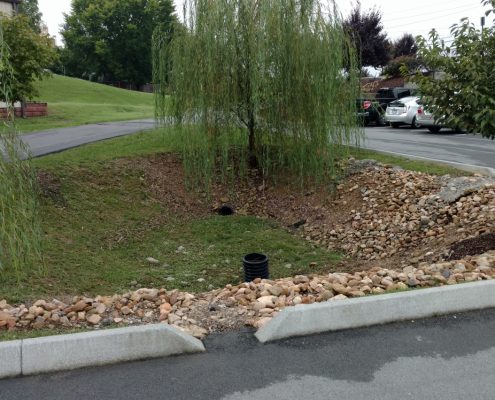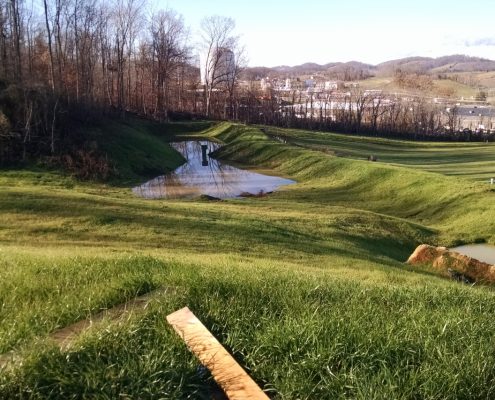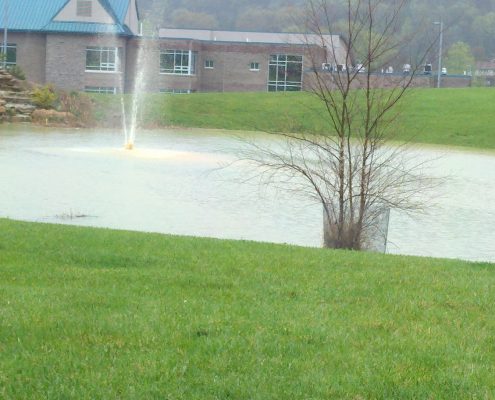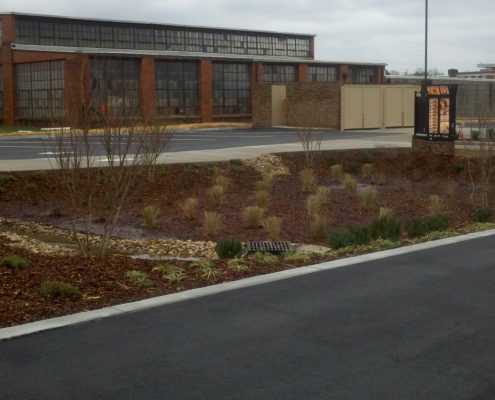Stormwater Management
The Clean Water Act has led to improvements in water quality with regard to point source discharges, such as industrial and wastewater treatment plant outfalls, through NPDES (National Permit Discharge Elimination System) permits. However, non-point source discharges, such as stormwater runoff, have become the leading cause of degradation, resulting in many waters of the state falling short of meeting their designated uses. These uses include swimming, fishing, contact recreation, aquatic life, and drinking water sources. In Kingsport and other urban areas, contaminated runoff originates from parking lots, residential/commercial/industrial developments, and redevelopment areas. The primary pollutants are sediment, oil, grease, and bacteria. The passage of federal and state stormwater regulations for small and medium-sized cities led to the City of Kingsport obtaining a Municipal Separate Storm Sewer System (MS4) NPDES Phase II permit in 2003.
The requirements of the MS4 permit are carried out by the City’s Stormwater Manager, along with the Stormwater Engineers, the Stormwater Quality Control Technician and the Maintenance Foreman. This team is responsible for achieving and maintaining compliance. With a proven track record of sustainable success, the Tennessee Department of Environment and Conservation (TDEC) accepted Kingsport’s application to become a Qualifying Local Program (QLP) in 2016. This designation allows Kingsport to issue stormwater construction permits for non-governmental projects and provides a more streamlined process.
Kingsport develops, implements, and enforces a Stormwater Management Program to protect water quality in our streams. The elements of the program are documented in a Stormwater Management Plan (SWMP), which is reviewed periodically to ensure compliance with current state and federal regulations.
The ultimate goal of Kingsport’s Stormwater Management Program is to improve water quality. Stormwater Control Measures such as detention, retention, treatment, or a combination of these, help to achieve this goal. Some examples are shown below. The City of Kingsport’s Stormwater Management Manual describes stormwater management in more detail.
Stormwater Control Measures (SCMs) are devices that are designed and constructed for a developed property to manage its stormwater runoff. They are a necessary part of any developed property because they can prevent the flooding, erosion, and pollution that can occur both on and off the property. Thus, SCMs are critically important to the health, safety, and welfare of a community and to the economic vitality of local businesses and industries.
There are many types of SCMs. Nearly all of them are designed to temporarily store (detain) stormwater before it is released off the property. Most SCM are also designed to filter or settle pollutants out of the water before cleaner water is released from the SCM and into local streams.
Like any piece of infrastructure, SCMs must be maintained to operate properly whenever it rains. When they are not maintained, they do not prevent stormwater problems. In fact, neglected SCMs can make flooding, erosion, and pollution worse. There can be enormous costs incurred for the repair of properties, roadways, or waterways that are damaged or polluted because SCMs have been maintained. However, when SCMs are properly maintained, their maintenance costs are relatively low. Often, well-maintained SCMs can function for many years needing only minor repairs.
Federal, State, and local governments in the United States are beginning to recognize the importance of SCM maintenance to public welfare. In Tennessee, the Tennessee Department of Environment and Conservation (TDEC) requires many cities and counties, including the City of Kingsport, to ensure SCMs designed to address stormwater pollution are maintained. Their intent is to safeguard local streams and regional waterways from the impacts of stormwater pollution.
The City of Kingsport ensures SCMs are maintained through requirements and enforcement provisions in local government ordinances (laws). These laws require property owners to protect, inspect, and maintain SCMs located on their property, so they are fully functional in keeping with their design. So, if you own property in Kingsport that has one or more SCMs, you are responsible for maintaining them in a fully functional condition. SCM maintenance activities can be carried out by others, such as tenants, property managers, or lawn/landscape contractors. But it is important to understand that the property owner is ultimately responsible for ensuring maintenance occurs.
| Owner Responsibilities
Inspect the SCM frequently to identify any maintenance needs. Maintain the SCM so it remains fully functional. Protect the SCM to prevent damage. Contact the City of Kingsport Stormwater Management Department if you have any questions. |
The Environmental Protection Agency (EPA) has information on the types of SCMs commonly found in Kingsport. Visit the website below to learn more:
https://www.epa.gov/npdes/national-menu-best-management-practices-bmps-stormwater-post-construction

